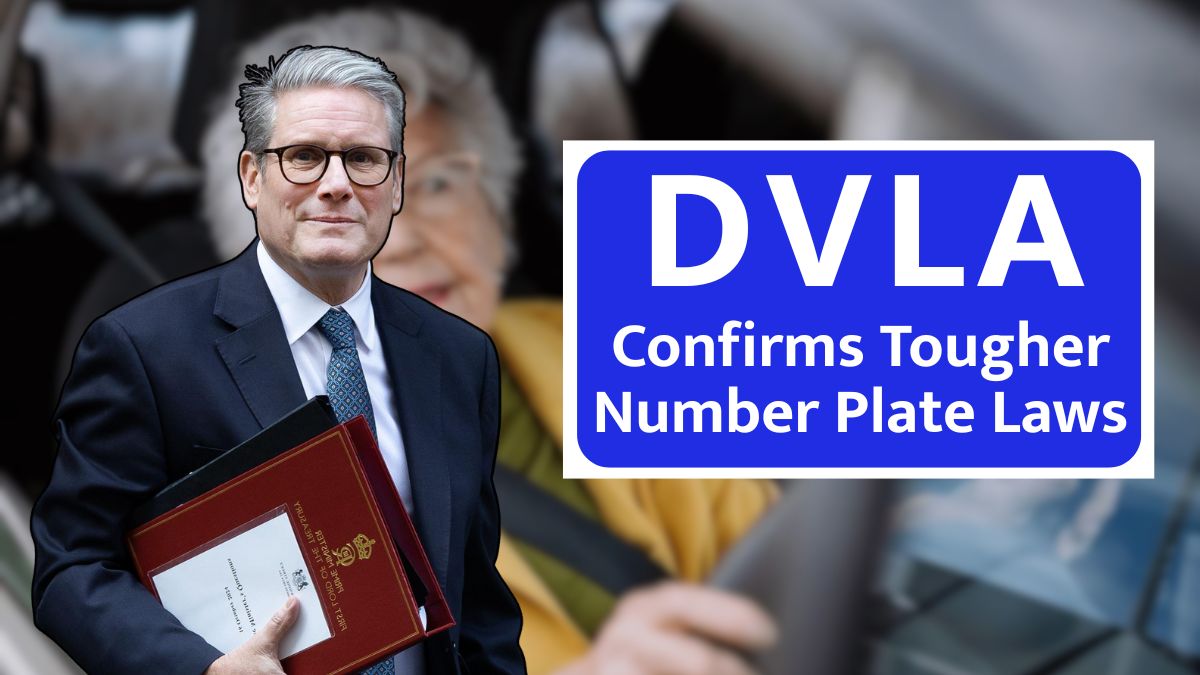The Driver and Vehicle Licensing Agency (DVLA) has confirmed new rules on vehicle number plates that will come into force in September 2025.
Under these stricter regulations, even minor mistakes with your vehicle’s number plate could result in fines of up to £1,000 and, in some cases, an automatic MOT failure.
Although many motorists may see number plates as a small detail, the DVLA stresses that they are essential for road safety, crime prevention, and vehicle identification. With tougher enforcement on the horizon, every UK driver is being urged to understand the new rules, the most common mistakes, and how to stay compliant.
Why Number Plates Are Crucial
Number plates do much more than identify a car. They are a central tool in:
- Tracking stolen vehicles – police rely on clear plates to recover stolen cars.
- Accident investigations – identifying vehicles involved in collisions.
- Traffic law enforcement – ANPR (Automatic Number Plate Recognition) cameras need clear, legal plates.
- Legal compliance – MOT, road tax, and insurance systems link directly to plate recognition.
Because of these functions, the DVLA enforces strict readability and design standards to ensure consistency across the UK.
DVLA Number Plate Rule 2025 – Quick Overview
| Category | Details |
|---|---|
| Authority | DVLA – Driver and Vehicle Licensing Agency |
| Start Date | September 2025 |
| Maximum Fine | Up to £1,000 |
| Key Offences | Incorrect spacing, illegal fonts, tinted/obscured plates, damage, or dirt |
| MOT Impact | Illegal/damaged plates will cause an automatic MOT failure |
| Enforcement | ANPR cameras, police roadside checks, MOT inspections |
| Risk | £100 fixed penalty on the spot, or up to £1,000 in court |
| Official Site | www.gov.uk |
What Will Change in 2025?
From September 2025, DVLA will step up enforcement against illegal, damaged, or unreadable plates. The targeted offences include:
- Incorrect spacing – altering plate layout to mimic names or words.
- Non-standard fonts – italic or decorative styles that reduce readability.
- Obscured or tinted plates – preventing cameras or officers from identifying numbers.
- Backgrounds or logos – only approved identifiers such as flags are legal.
- Dirty or faded plates – mud, snow, or fading making numbers unclear.
Importantly, a vehicle with an illegal plate will now fail its MOT and cannot be legally driven until corrected.
Common Mistakes That Could Cost You
Incorrect Spacing
Some drivers alter private plates to spell words or names. This is illegal and a key focus of the crackdown.
Decorative Fonts
Only the Charles Wright font is permitted. Any variation, such as italic or cursive, will be unlawful.
Unauthorized Backgrounds and Logos
DVLA-approved flags or identifiers are allowed, but extra stickers, designs, or symbols make a plate illegal.
Damaged or Faded Plates
Plates must remain reflective and clearly visible. Cracks, fading, or discoloration are enough to trigger a fine.
Dirty Plates
Plates obscured by dirt, mud, or snow are also classed as unreadable and may result in on-the-spot fines.
Legal Requirements for UK Plates
According to DVLA regulations, a legal number plate must:
- Be white with black characters at the front, and yellow with black characters at the rear.
- Use the Charles Wright font in standard size and spacing.
- Display the BS (British Standard) number and supplier details.
- Be free from cracks, obstructions, or unauthorized designs.
How Enforcement Will Work
The DVLA will rely on both technology and stricter MOT checks:
- ANPR cameras – will automatically detect illegal or unreadable plates.
- Police roadside checks – officers can issue £100 fixed penalty notices instantly.
- MOT failures – from September 2025, any vehicle with an illegal plate will automatically fail.
Penalties for Non-Compliance
Failing to follow DVLA rules could result in:
- £100 on-the-spot fine through a Fixed Penalty Notice.
- Court fines up to £1,000 if the case escalates.
- Plate withdrawal – DVLA can revoke personalized or illegal plates.
- MOT failure – leading to repair costs and delays in getting your car roadworthy.
The DVLA argues that these penalties are vital because illegal plates obstruct law enforcement, help offenders evade detection, and undermine road safety.
Impact on Personalized Number Plates
Personalized registrations remain popular in the UK, but stricter enforcement means:
- Altered spacing to form words will no longer be tolerated.
- Decorative backgrounds, patterns, or fonts will not be permitted.
- Non-compliant plates may be revoked by the DVLA.
This could frustrate car enthusiasts, but the DVLA insists the move is about uniformity and safety.
How to Stay Compliant and Avoid Fines
Motorists can protect themselves by following a few simple steps:
- Check plates regularly – clean and inspect for cracks or fading.
- Use DVLA-approved suppliers – only buy replacements from licensed providers.
- Avoid alterations – spacing, unusual fonts, or decorative designs are risky.
- Replace damaged plates quickly – don’t wait until your MOT fails.
Public Reaction to the New Rules
The stricter rules have prompted mixed responses:
- Supporters – argue the crackdown improves safety and helps prevent crime.
- Critics – believe the fines are too harsh for what may seem like minor infractions.
- Car enthusiasts – worry about losing flexibility when customizing plates.
Despite differing opinions, the DVLA maintains that consistency and readability must take priority for the benefit of all road users.
FAQs
1. When will the new DVLA number plate rules start?
The updated rules come into effect from September 2025 across the UK.
2. What is the maximum fine for illegal number plates?
Motorists face fines of up to £1,000, with a fixed penalty of £100 on the spot.
3. Will an illegal number plate cause my car to fail its MOT?
Yes. From September 2025, a non-compliant plate will be an automatic MOT failure.
4. Are personalized number plates still allowed?
Yes, but spacing, fonts, and backgrounds must comply with DVLA rules. Plates that fail these standards risk withdrawal.
5. How can I make sure my plate is legal?
Follow DVLA guidelines: correct font, correct spacing, legal colors, and cleanliness. Always buy from approved suppliers.









